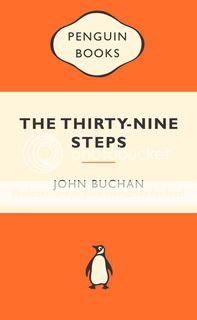Year of publication: 1915
Series and no.: Richard Hannay # 1/5
Genre: Thriller
Setting & time: England and Scotland, contemporary
Richard Hannay, having grown up in Rhodesia and now living in London, is bored to distraction by his life in England and seriously considering going back to Africa when his neighbour seeks his help. The man, it turns out, is a spy or an associate of spies, and has important information that will be of no use until a certain date. Until then he must stay alive. This he fails to do and Hannay finds him murdered in his apartment and has to go on the run, under suspicion for the murder and chased by the police and spy gang who killed his neighbour.
This is one of the early espionage thrillers in the modern mold, and as such, one can recognise many of the traits of the modern spy thriller in it.
A review or discussion I read of this novel said that in modern retrospect Hannay comes across as somewhat of a cliché, so I took care to read the book as if I was not deeply familiar with the genre. I found the story remarkably fresh considering its age, although some attitudes come across as old-fashioned – but then again they don’t really: prejudice against the Jewish people is as strong as ever, if slightly more hidden than it seems to have been then, and there still exists a version of the story the neighbour tells Hannay at the beginning, about a Jewish-anarchist plot to start a war, although it has of course changed into something more modern in the interval.
The story is very much plot-driven, but that is not to say that Hannay isn’t a rounded character – he’s such an archetype of the strong, silent and resilient man that some might read him as a stereotype, but his reliance on others and certain other qualities prevent that. Even the people he meets briefly on the road don’t come across as cardboard figures, which is no small feat in a plot-driven story and bears testament to Buchan’s writing skill.
The plot is, of course, wildly improbable, and no-one can accuse Buchan of belonging to the realist school of espionage writing. The plotting can be directly traced to its antecedents which are the adventure tale and the mystery. The story is fast paced and short and makes a fast, breezy and entertaining read. Altogether a very nice ‘boys own’ adventure that will fit nicely on the shelf right beside The Riddle of the Sands. 4 stars.
Series and no.: Richard Hannay # 1/5
Genre: Thriller
Setting & time: England and Scotland, contemporary
Richard Hannay, having grown up in Rhodesia and now living in London, is bored to distraction by his life in England and seriously considering going back to Africa when his neighbour seeks his help. The man, it turns out, is a spy or an associate of spies, and has important information that will be of no use until a certain date. Until then he must stay alive. This he fails to do and Hannay finds him murdered in his apartment and has to go on the run, under suspicion for the murder and chased by the police and spy gang who killed his neighbour.
This is one of the early espionage thrillers in the modern mold, and as such, one can recognise many of the traits of the modern spy thriller in it.
A review or discussion I read of this novel said that in modern retrospect Hannay comes across as somewhat of a cliché, so I took care to read the book as if I was not deeply familiar with the genre. I found the story remarkably fresh considering its age, although some attitudes come across as old-fashioned – but then again they don’t really: prejudice against the Jewish people is as strong as ever, if slightly more hidden than it seems to have been then, and there still exists a version of the story the neighbour tells Hannay at the beginning, about a Jewish-anarchist plot to start a war, although it has of course changed into something more modern in the interval.
The story is very much plot-driven, but that is not to say that Hannay isn’t a rounded character – he’s such an archetype of the strong, silent and resilient man that some might read him as a stereotype, but his reliance on others and certain other qualities prevent that. Even the people he meets briefly on the road don’t come across as cardboard figures, which is no small feat in a plot-driven story and bears testament to Buchan’s writing skill.
The plot is, of course, wildly improbable, and no-one can accuse Buchan of belonging to the realist school of espionage writing. The plotting can be directly traced to its antecedents which are the adventure tale and the mystery. The story is fast paced and short and makes a fast, breezy and entertaining read. Altogether a very nice ‘boys own’ adventure that will fit nicely on the shelf right beside The Riddle of the Sands. 4 stars.


Comments